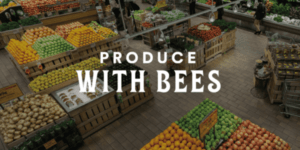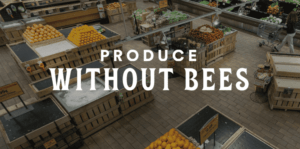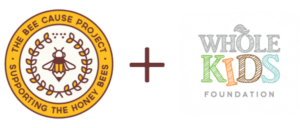Whole Foods enacts pollinator policy for produce suppliers
Whole Foods Market, a retailer that has long championed pollinator health through its commitment to organic agriculture, has a new pollinator policy for its fresh produce and floral purchasing, according to a news release.

As part of the new pollinator policy, by 2025, the company will:
- Require all fresh produce and floral growers to implement an integrated pest management (IPM) system, prioritizing preventative and biological pest control measures.
- Prohibit the use of nitroguanidine neonicotinoids (clothianidin, dinotefuran, imidacloprid, and thiamethoxam) in all potted plants they sell.
- Encourage all fresh produce and floral suppliers to phase out the use of nitroguanidine neonicotinoids.
In addition to honeybees, Whole Foods Market recognizes native pollinators, such as bumble bees, wasps and butterflies, are critical to the food system and an important indicator of biodiversity, according to the release.

“We understand the important role pollinators play in our food system and, through this policy, will build on our long legacy of supporting biodiversity and pollinator health,” Karen Christensen, senior vice president of perishables and quality standards, said in the release. “This is another critical step forward in our journey of climate-smart agriculture as part of our purpose to nourish people and the planet.”

The company engages its foundations and internationally recognized third parties to create campaigns that raise awareness of pollinators and their impact. In addition, its Whole Kids Bee Grant Program helps schools and non-profit organizations receive support for educational beehives and bee programming so students can observe them up close. Since 2014, the Whole Kids Bee Grant program has awarded more than 850 beehives to schools and nonprofits with support from The Bee Cause Project.
Whole Foods Market encourages all fresh produce and floral suppliers to phase out the use of nitroguanidine neonicotinoids and adopt other solutions. Whole Foods Market suppliers like Rainier Fruit continue to demonstrate their commitment to advancing pollinator health by maintaining 150 acres of dedicated pollinator habitat, in addition to 325 acres of Bee Better Certified orchard in partnership with the Xerces Society for Invertebrate Conservation.
“Every single piece of fruit we grow requires pollination. We wouldn’t have a crop without honeybees, so pollinator health is of utmost importance for us as farmers,” Mark Zirkle, president of Rainier Fruit, said in the release. “We’re appreciative of Whole Food’s advocacy and look forward to continued efforts towards more sustainable agriculture.”
For more information on how Whole Foods Market is protecting pollinators and raising awareness for the critical role they play, visit the company’s pollinator health webpage.


 Video Library
Video Library 




















